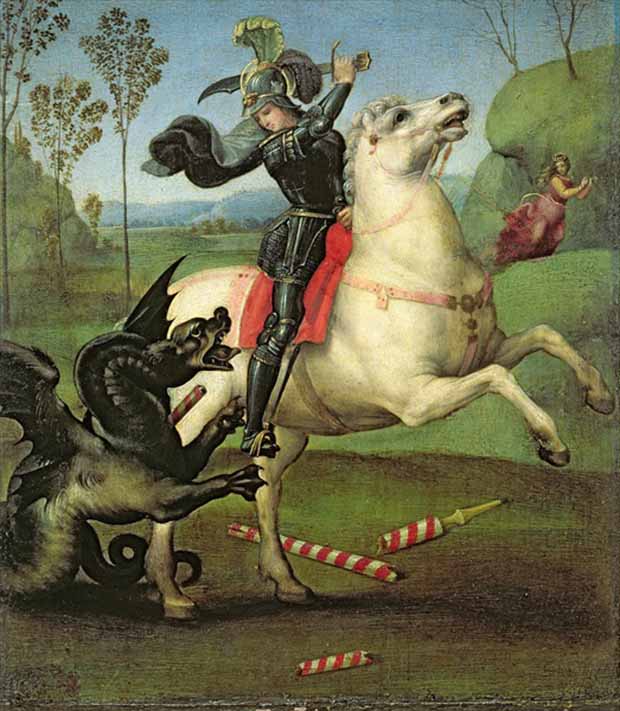
For a video version of this blog, click here.
The mythical figure of a dragon is found in countless stories and tales from ancient times. One of my favorites is the legend of St. George and the Dragon from the 11th century. As the story goes, a dragon was terrorizing the countryside and the only way to appease it was through human sacrifice, chosen by lot. Sadly, the lot at some point fell on the king’s daughter. But while she was awaiting her doom, St. George rode up on horseback and decided to challenge the dragon in order to save the princess. When the dragon approached, he made the sign of the cross, charged forth, and seriously wounded it, later beheading it.
But tales of dragons like this one are not just curiosities of ancient lore. The idea of a dragon still resonates with men. Dragons represent opposition and resistance, a mortal enemy that must be confronted if a man is to continue on his journey as a man. Appeasement won’t do it. Cowering in the corner won’t do it. Wishing it would all go away won’t do it. There comes a time when a man simply has to arise and challenge the opposition.
What could that dragon be today? It could be a long-simmering conflict with a boss. It could be the way you have felt treated by your family for years. It could be choosing a path that will be unpopular with friends. It could be making your voice known in a situation where you have remained silent. It could be doing something you have feared as long as you can remember.
The dragons out there are endless. But the noble man’s response to it is the same. He gets up and charges.
When a man chooses this path, something inside of him stands up. Something reckless is released as well. He is tasting a bit of his glory as a man, of feeling solid and whole. The dragon is no longer a curse to be feared, but a passageway into manhood, even a gift in disguise.
But there is more here for men of faith. Early depictions of the dragon didn’t have scales and wings like the ones with which we are familiar. They were much more like serpents, perhaps much more like the great snake that darkens the early pages of the Bible, Satan himself. Here we find another princess who needs to be rescued, Eve herself. She is being manipulated and deceived by the Great Serpent. And what was Adam’s response? It wasn’t noble. He may have been cowering in the corner or wishing it would all go away as the serpent approached. We don’t exactly know. What we do know is that he says nothing. He does nothing. And he doesn’t charge. Instead, he capitulates, takes the fruit, and ensnares both Eve and himself into the dominion of the Serpent (Gen. 3:1-7).
But Adam’s story does not have to be our story as men. Through Jesus, we are now called out as those who are more than conquerors. The Apostle John puts it this way, addressing men who have charged the dragon: “I have written to you, young men, because you are strong, God’s word remains in you, and you have conquered the evil one” (I John 2:14).
Every man (including myself) has felt enslavement to the dominion of the evil one. It could be accusation over past sins. It could be deception about some addiction. It could be shame over some evil perpetrated on you. It could be the whisper in the darkness that pronounces despair over your soul. But you do not have to cower in the corner anymore. You do not have to be silent anymore. When you charge the dragon with Christ at your side, there is only one outcome — the dragon will go down.
You can become that man who is strong, who has God’s word remaining in you, and who has conquered the evil one. You can become that noble man.
Let John’s words be your hope.
Let Jesus make them a reality.




